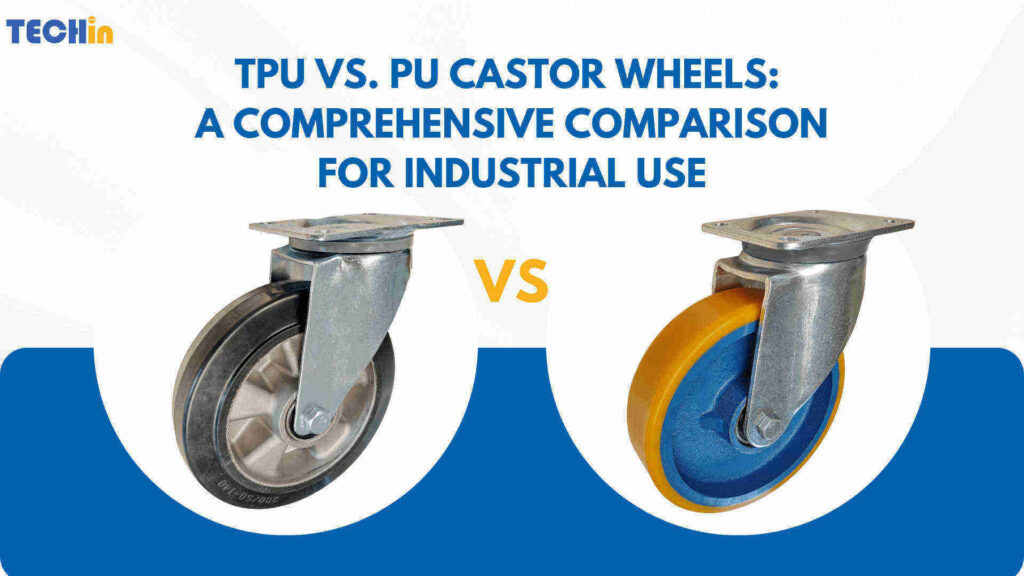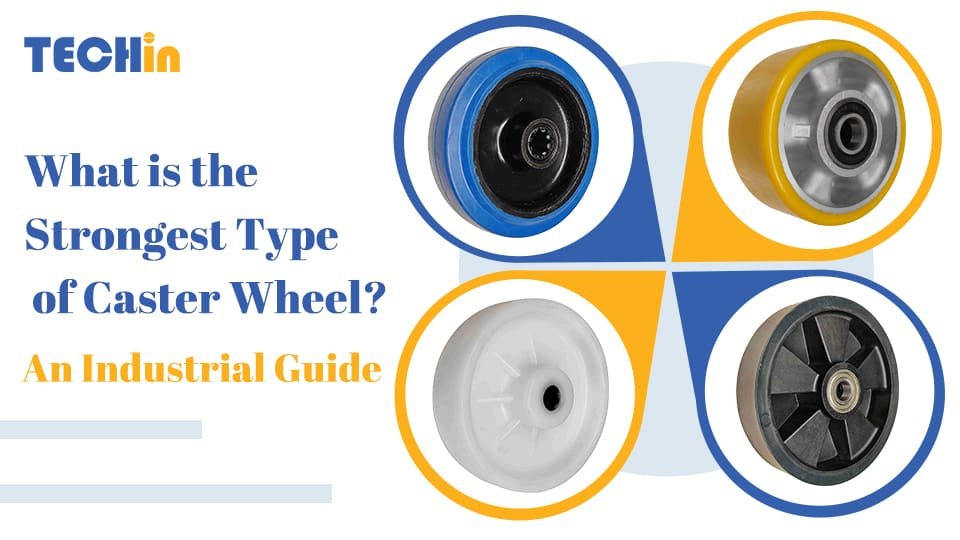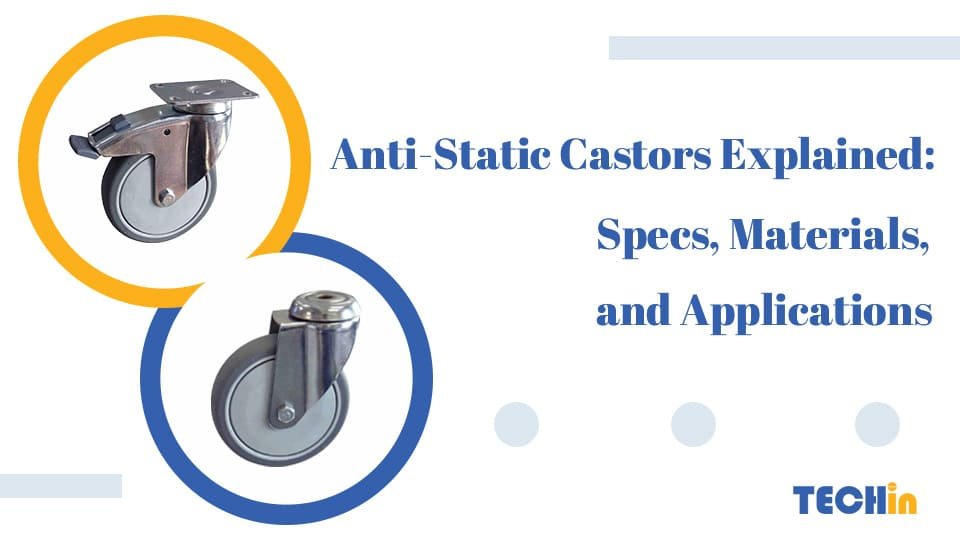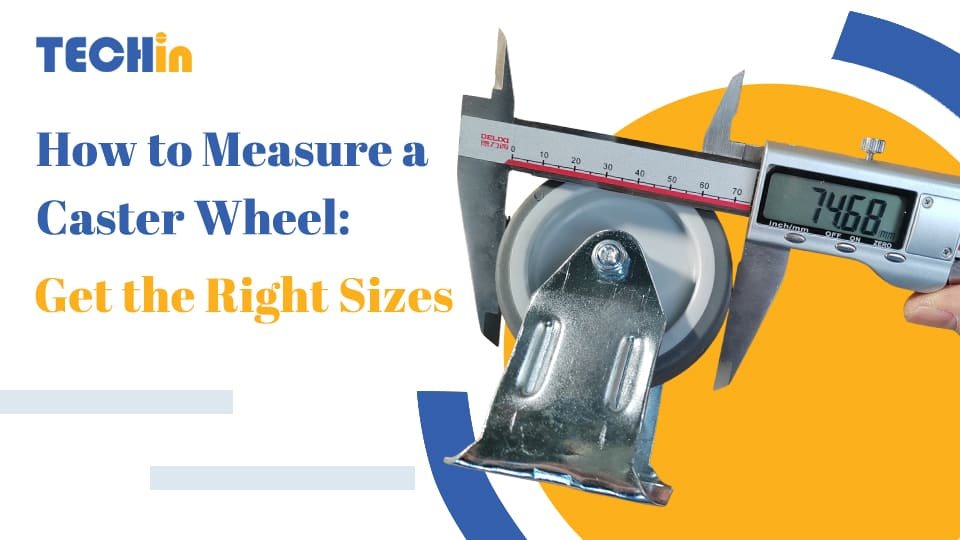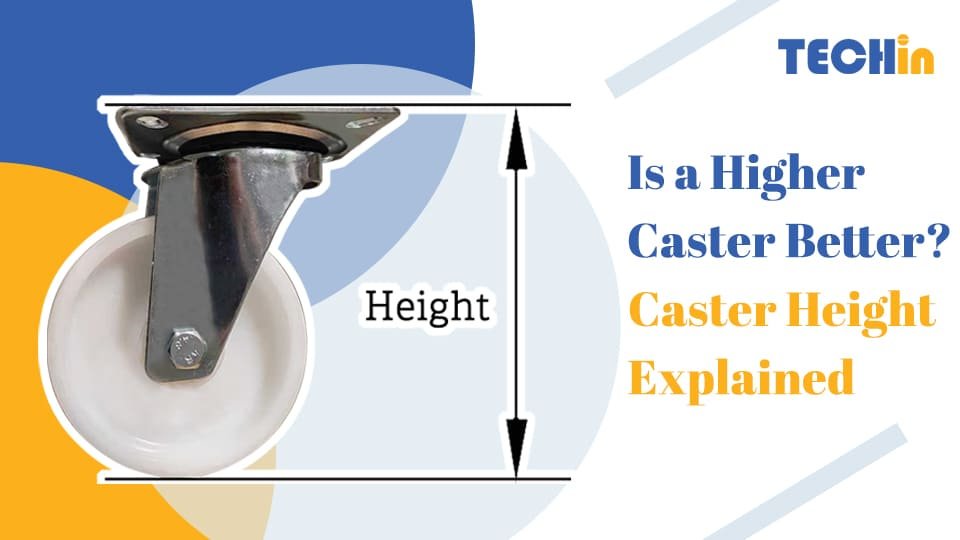Castor wheels are a crucial component in ensuring smooth movement across various equipment, machinery, and furniture. TPU (Thermoplastic Polyurethane) and PU (Polyurethane) castor wheels are two of the most popular materials used for castor wheels. Each has its own benefits based on its properties and how it performs in different environments. In this guide, we’ll look at the advantages, comparison, applications, and maintenance tips for both TPU and PU castor wheels so you can make the best choice for your needs.
1. Introduction to TPU and PU Castor Wheels
1.1 What Are TPU Castor Wheels?
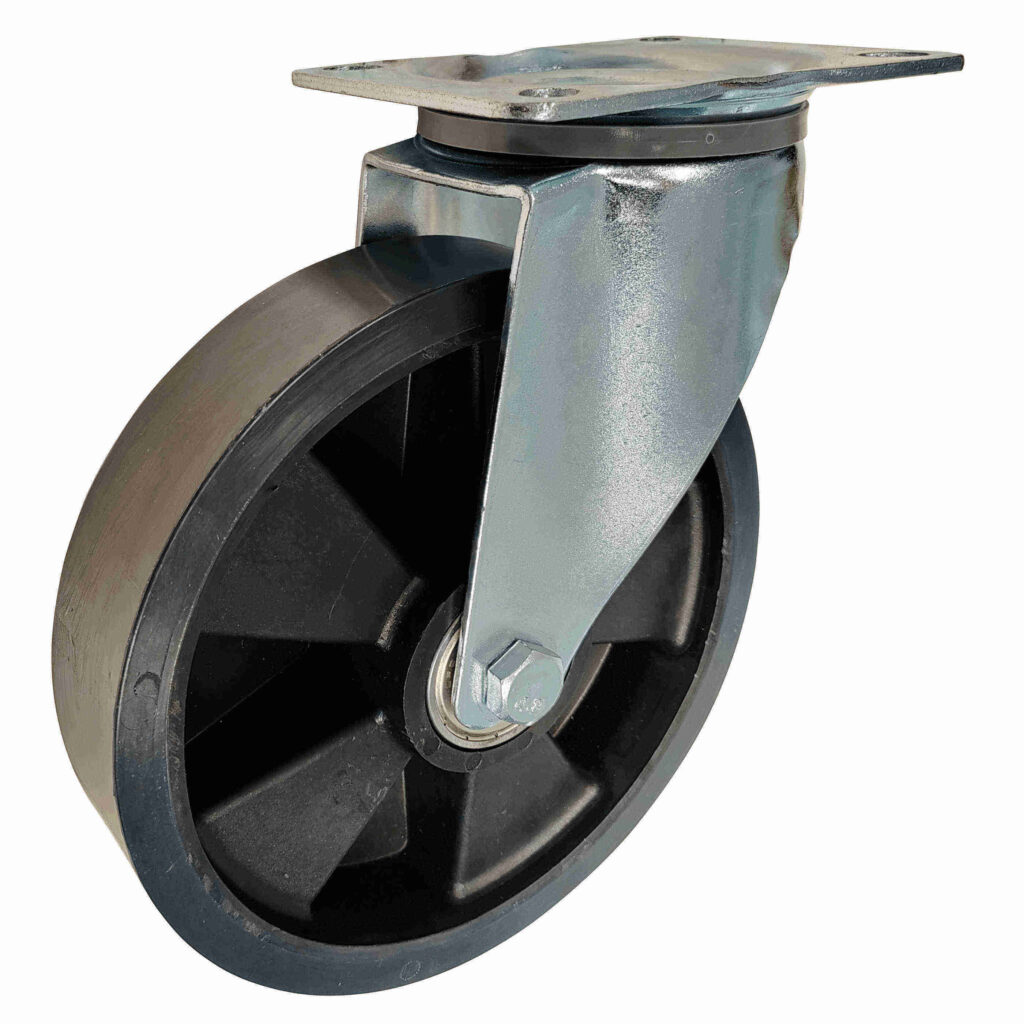
TPU (Thermoplastic Polyurethane) castor wheels are designed for industrial and heavy-duty applications due to their superior properties such as high load bearing capacity, abrasion resistance, and resilience. TPU is a type of plastic that provides a unique combination of the flexibility of rubber with the strength and durability of plastic.
- Flexibility: TPU is highly flexible, which allows it to adapt well to uneven and rough surfaces. It distributes pressure more evenly and can deform slightly under load, returning to its original shape after the load is removed.
- Durability: TPU wheels are durable and resistant to wear and tear, making them ideal for environments with heavy traffic or where constant movement is required.
- Chemical & UV Resistance: TPU can resist chemicals, oils, and UV exposure better than PU, which makes it well-suited for more aggressive environments such as factories, warehouses, and environments exposed to harsh conditions.
1.2 What Are PU Castor Wheels?
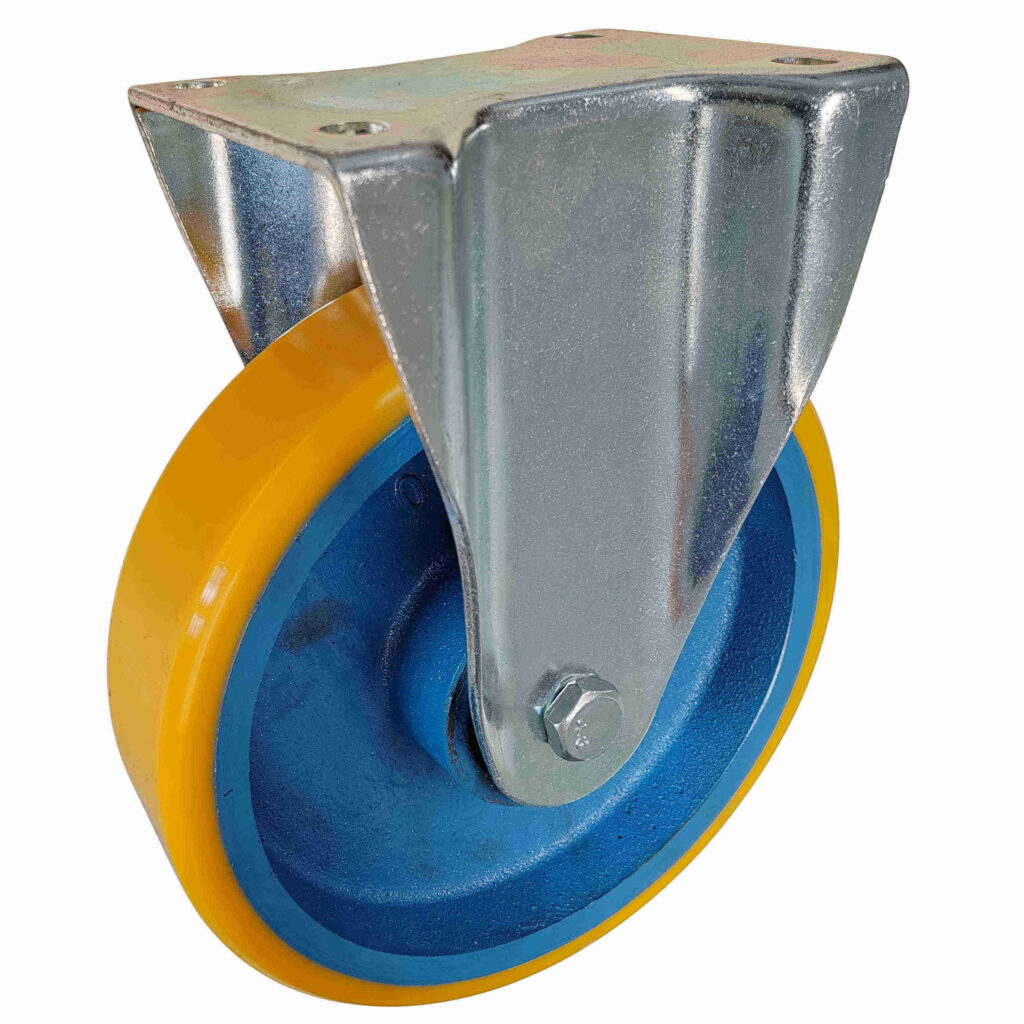
PU (Polyurethane) castor wheels are a popular choice for general-purpose environments. PU wheels are made from a synthetic polymer that exhibits excellent shock absorption qualities, making them ideal for environments that prioritize noise reduction, smooth movement, and floor protection.
- Shock Absorption: PU wheels are known for their shock-absorbing capabilities, which help in absorbing vibrations and impacts, making them suitable for use on hard or smooth floors.
- Floor Protection: One of the primary advantages of PU wheels is their ability to protect the floor surfaces from scratches and damage. This makes them ideal for environments with delicate or polished floors such as retail stores, hospitals, and office furniture.
- Durability: While PU is durable, it is more suited for medium-duty applications where the wheels are not subjected to extreme loads or harsh chemicals.
2. Key Differences Between TPU and PU Castor Wheels
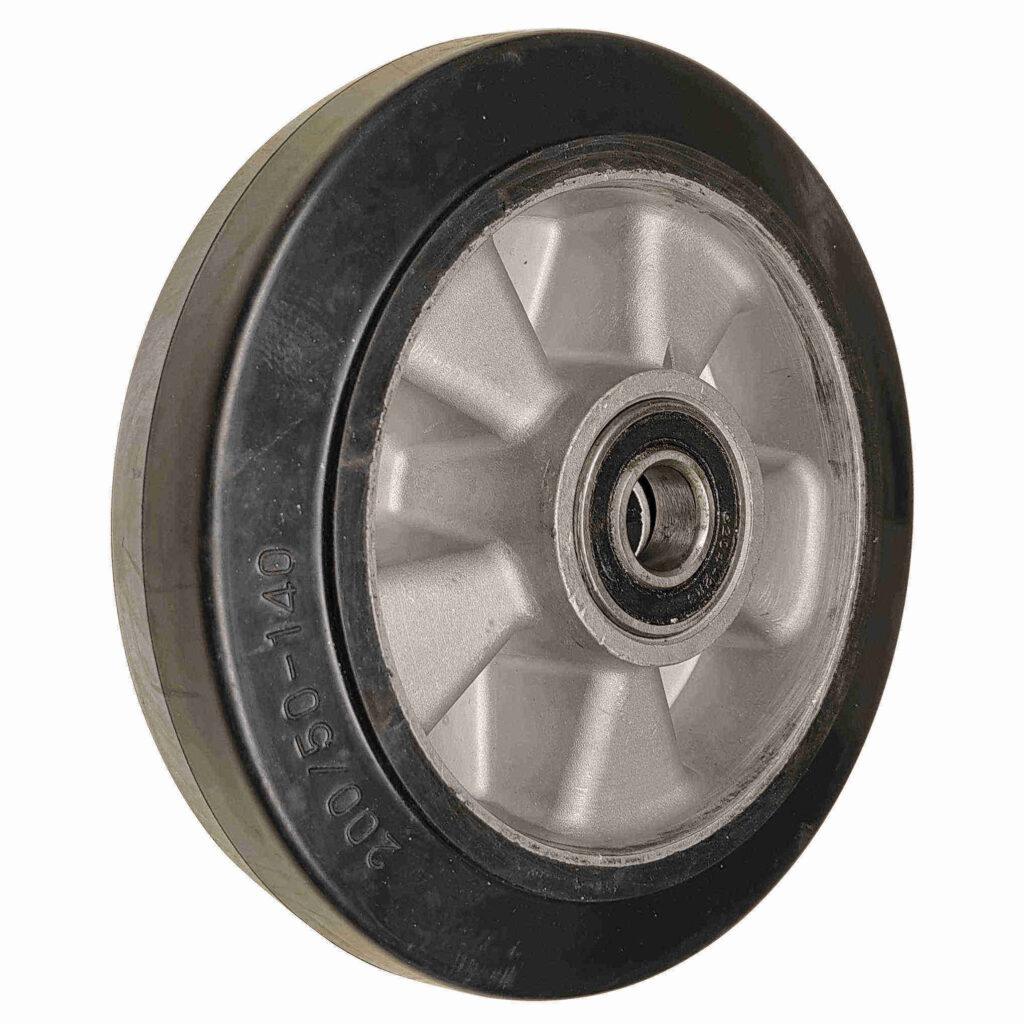
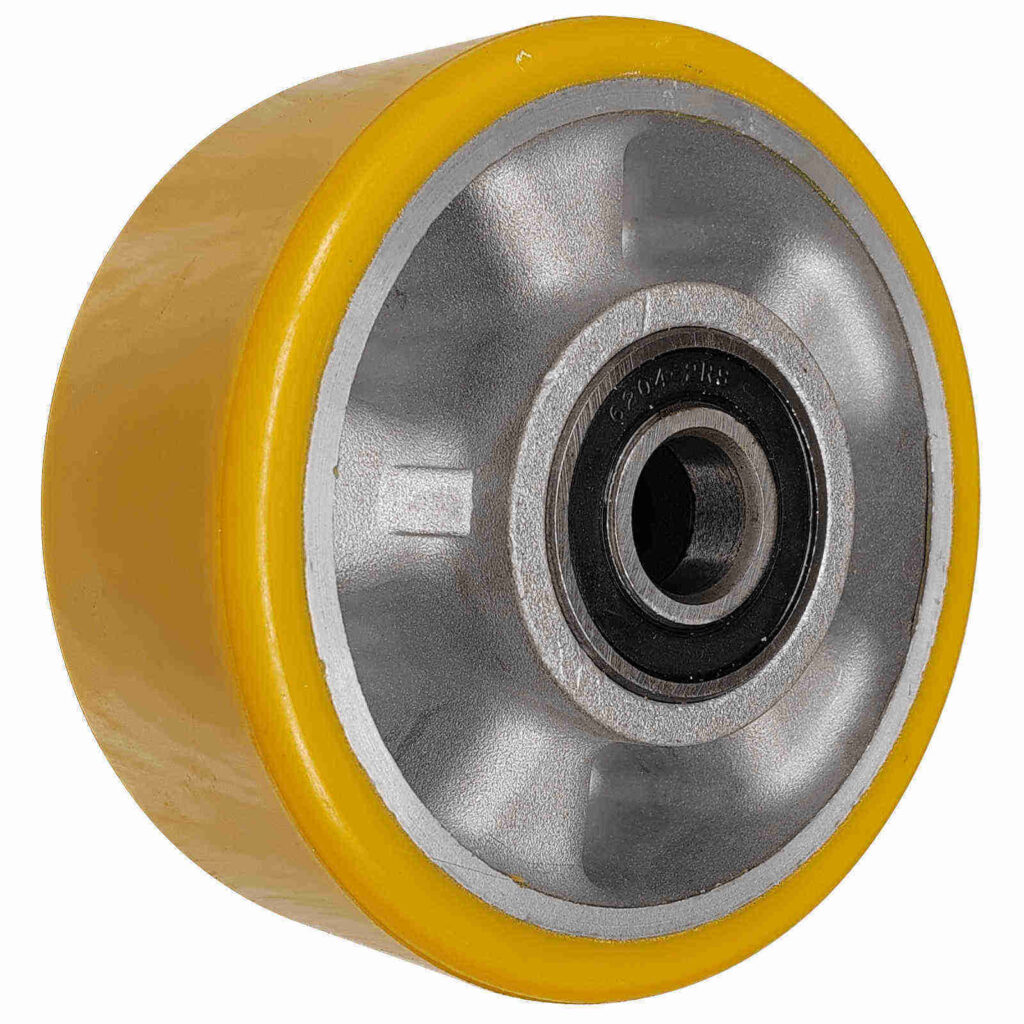
| Feature | TPU Castor Wheels | PU Castor Wheels |
|---|---|---|
| Durability | Extremely durable, handles extreme wear and tear. | Less durable; best for medium-duty tasks. |
| Load Capacity | High load-bearing capacity for heavy machinery. | Best for lighter loads like office furniture. |
| Temperature Resistance | Resistant to extreme temperatures. | Limited temperature resistance. |
| Chemical Resistance | Excellent resistance to oils, solvents, and chemicals. | Moderate resistance to chemicals. |
| Noise Reduction | Quieter than metal wheels; ideal for noise-sensitive areas. | Very quiet and smooth operation. |
| Flexibility | Highly flexible, making it suitable for uneven surfaces. | Less flexible but still provides good performance. |
| Cost | Higher cost due to superior performance. | More affordable for general use. |
3. Comparison of TPU and PU Castor Wheels
3.1 Which Offers Better Load Capacity: TPU or PU?
The load capacity is a critical factor in selecting the right castor wheels, especially in industrial or commercial settings where heavy machinery or equipment is frequently moved. When comparing TPU and PU, TPU wheels are generally better suited for heavy-duty applications.
TPU Wheels:
- Higher Load Capacity: TPU castor wheels are engineered to handle heavier loads and more demanding environments. They are often used in industrial machinery, heavy-duty carts, and factory settings where constant movement and high-impact resistance are needed.
- Superior Performance Under Stress: TPU wheels maintain their shape and integrity under heavy load and impact, which makes them ideal for high-traffic environments such as warehouses, shipping docks, and production lines.
PU Wheels:
- Best for Medium-Duty Applications: While PU wheels are durable, they are better suited for moderate load-bearing applications. For example, office chairs, light-duty carts, and shopping carts.
- Less Load-Bearing Capacity: PU wheels may not be able to withstand the high-pressure demands of heavy machinery but are sufficient for light to medium-duty uses.
3.2 TPU vs. PU: Impact on Surface Protection
Both TPU and PU wheels provide varying degrees of floor protection, but the material choice should depend on your environment and the type of surface you are working with.
TPU Wheels:
- Rough and Uneven Surfaces: TPU wheels perform well on uneven or rough surfaces, making them ideal for environments like factories, construction sites, and warehouse floors. TPU wheels handle impact and abrasion without compromising their structure.
- Harder and More Durable: TPU is resistant to wear and tear, making it the ideal choice for high-traffic industrial settings, where floors are more prone to wear.
PU Wheels:
- Gentle on Polished Floors: PU wheels excel in environments where floor protection is critical, such as polished concrete, wooden floors, or tile floors. They are soft enough to prevent scratches or scuff marks on delicate flooring.
- Noise Reduction: PU wheels are particularly suited for noise-sensitive environments such as hospitals, libraries, or retail stores because they provide a smooth and quiet ride across floors.
4. Performance Considerations: TPU vs. PU Castor Wheels
4.1 Performance in Heavy-Duty Environments: TPU vs. PU
In heavy-duty environments, the choice between TPU and PU will depend on the type of equipment and load being moved. Here’s how each performs under such conditions:
TPU Wheels:
- Heavy Equipment and High Impact: TPU wheels are specifically designed to withstand extreme loads and harsh conditions. They are commonly used in industrial machinery, hospital equipment, and heavy-duty carts.
- More Resilient to Damage: Due to their superior abrasion resistance, TPU wheels can endure prolonged use in high-stress environments, providing reliable and durable performance.
PU Wheels:
- Medium Duty for Office or Light Equipment: PU wheels are more appropriate for office furniture, light-duty carts, and small machinery that don’t need the high performance of TPU. While they perform well in lighter-duty applications, they aren’t built for extreme conditions.
- Less Impact Resistance: PU is more likely to degrade in extreme environments or under continuous heavy impact.
4.2 Performance in Chemical Environments: TPU vs. PU
Both TPU and PU are resistant to mild chemicals and oils, but TPU outperforms PU when it comes to handling more corrosive chemicals and extreme environments.
TPU Wheels:
- Better Chemical Resistance: TPU wheels have a higher resistance to chemicals, solvents, oils, and greases compared to PU. This makes them ideal for use in chemical processing plants, food processing areas, and laboratories where exposure to harmful substances is common.
- Long-Term Durability: TPU’s ability to resist chemicals without degrading ensures a longer lifespan, even in highly corrosive environments.
PU Wheels:
- Moderate Chemical Resistance: PU wheels perform well in environments with low-to-moderate chemical exposure, but their chemical resistance is not as robust as TPU’s.
- Potential Degradation: Harsh chemicals, such as certain acids or solvents, can cause PU wheels to degrade over time, reducing their effectiveness.
5. Maintenance Tips for TPU and PU Castor Wheels
Proper maintenance is essential to ensure the longevity and efficiency of TPU and PU wheels. Regular maintenance can prevent costly repairs and improve performance.
5.1 Maintenance Tips for TPU Castor Wheels
- Regular Inspections: Check for any cracks, deformation, or wear. TPU wheels are tough but need to be monitored for any signs of damage that could affect performance.
- Cleaning: Keep the wheels clean by removing dirt, dust, and debris. This prevents excessive abrasion and ensures the wheels roll smoothly.
- Lubrication: Lubricate the bearings to reduce friction and maintain smooth movement.
- Avoid Overloading: Ensure that the weight of the items being moved does not exceed the rated load capacity of the TPU wheels.
5.2 Maintenance Tips for PU Castor Wheels
- Routine Cleaning: Just like TPU wheels, PU wheels should be regularly cleaned to remove dirt and prevent friction build-up.
- Lubrication: Periodically lubricate the wheel bearings to ensure smooth operation.
- Check for Wear: Pay attention to signs of wear, such as flattening or balding, and replace the wheels when needed.
- Load Limitations: Be sure not to exceed the load capacity of PU wheels. Overloading them can lead to premature wear.
6. Which Castor Wheel Should You Choose for Your Business?
Ultimately, your decision will depend on factors like load-bearing capacity, environmental conditions, and cost. TPU wheels are ideal for highly abrasive, heavy-duty applications where long-lasting performance is critical. They are perfect for environments that require high resilience, shock absorption, and temperature resistance. PU wheels, on the other hand, are perfect for more versatile, cost-conscious applications, where a balance of performance and price is key. They are well-suited for environments with moderate temperatures, impact resistance needs, and chemical exposure.
7. Conclusion
Both TPU and PU castor wheels have their own advantages for specific applications. TPU is great for heavy-duty, industrial, and chemical-resistant environments. PU is perfect for medium-duty, floor-sensitive, and noise-sensitive applications. By considering factors like load capacity, floor type, and environmental conditions, you can make the best decision for your needs.
When you’re choosing your castor wheels, always keep in mind the long-term benefits of proper maintenance, and choose the material that aligns best with your operational requirements.
This detailed comparison provides valuable insights into both types of castor wheels and will help you make an informed decision based on your specific needs. If you have further questions or need personalized recommendations, feel free to reach out to industry experts or the manufacturers directly.

